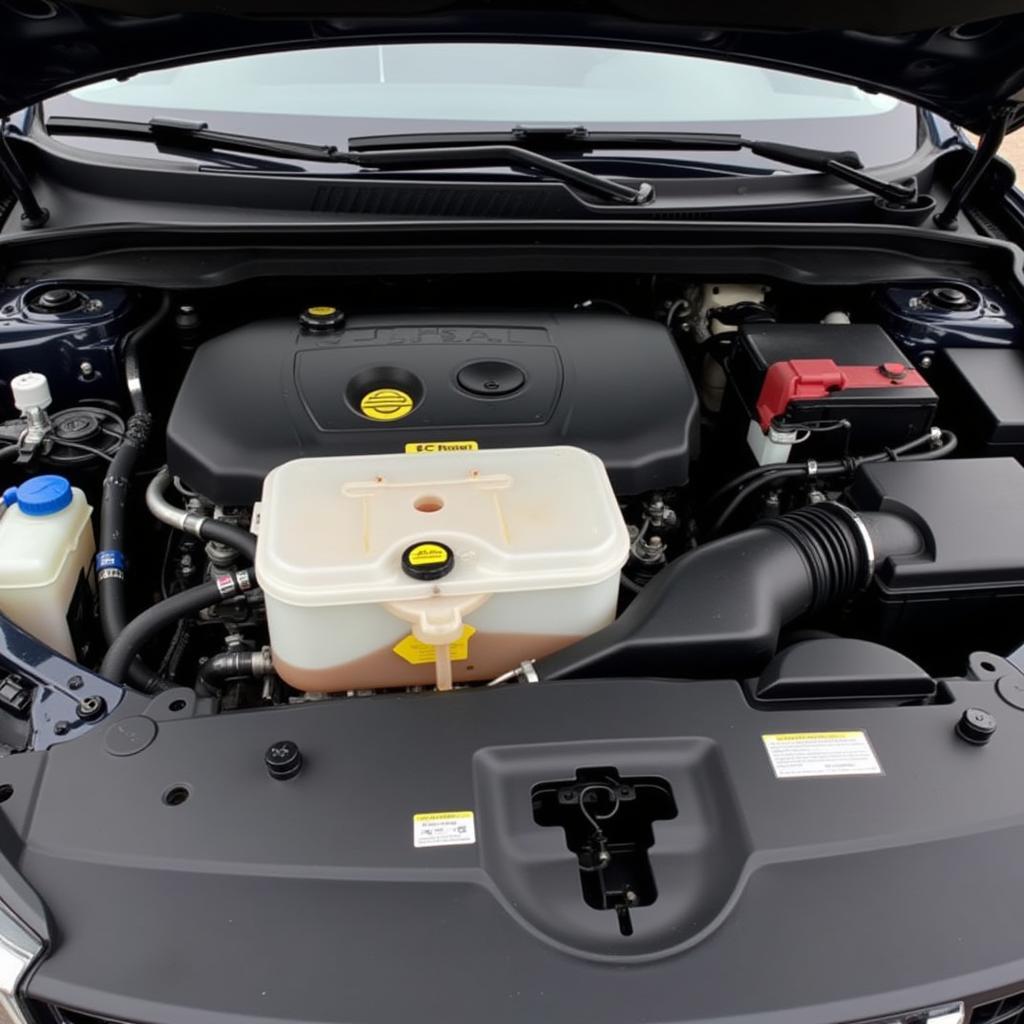A “warner air over electric brake controller” is a critical component in many modern towing setups, serving as the bridge between your vehicle and your trailer’s electric brakes. It ensures safe and controlled braking when hauling heavy loads. However, like any complex system, these controllers can sometimes throw a curveball.
This comprehensive guide delves deep into common issues associated with Warner air over electric brake controllers, equipping you with the knowledge and steps to diagnose and address them effectively.
Understanding Your Warner Air Over Electric Brake Controller
Before we dive into troubleshooting, it’s crucial to grasp the basics of how these controllers operate. In essence, a Warner air over electric brake controller uses the air pressure generated by your vehicle’s braking system to activate an electrical signal. This signal then engages the electric brakes on your trailer, proportionally to the pressure applied to your vehicle’s brake pedal.
This seamless integration of air and electric systems ensures smooth and controlled braking even with heavy loads.
Common Issues and Troubleshooting Tips
Now, let’s explore some prevalent issues encountered with Warner air over electric brake controllers and provide practical solutions to get you back on the road safely:
1. No Trailer Brake Output
Symptoms: You press the brake pedal, but the trailer brakes fail to engage.
Possible Causes:
- Blown Fuse: The most common culprit is a blown fuse in your vehicle’s fuse box.
- Loose Wiring: Check all connections between the controller, vehicle, and trailer for looseness or corrosion.
- Faulty Brake Controller: In some cases, the brake controller itself might be malfunctioning.
Troubleshooting Steps:
- Check the Fuse: Locate the fuse associated with the brake controller in your vehicle’s fuse box (refer to your owner’s manual). If the fuse is blown, replace it with a new one of the same amperage.
- Inspect Wiring and Connections: Thoroughly examine all wiring harnesses and connections for any signs of damage, looseness, or corrosion. Secure any loose connections and repair or replace damaged wiring.
- Test the Brake Controller Output: If the fuse and wiring seem fine, use a circuit tester to check for voltage at the trailer connector when the brake pedal is depressed. If there’s no voltage, the brake controller itself might be faulty.
2. Trailer Brakes Lock Up
Symptoms: The trailer brakes engage prematurely or lock up even with light braking.
Possible Causes:
- Controller Sensitivity Setting: An overly sensitive controller setting can cause the brakes to lock up easily.
- Short Circuit: A short circuit in the wiring can lead to unpredictable brake behavior.
- Faulty Brake Magnets: Worn-out or damaged brake magnets on the trailer can also cause lockups.
Troubleshooting Steps:
- Adjust Controller Sensitivity: Start by lowering the sensitivity setting on the brake controller. Gradually increase it until you achieve smooth and controlled braking.
- Inspect for Short Circuits: Carefully examine the wiring between the controller and the trailer for any signs of exposed wires or areas where insulation might be compromised. Repair any short circuits found.
- Check Trailer Brake Magnets: Inspect the brake magnets on each trailer wheel for proper operation. Replace any worn-out or damaged magnets.
3. Inconsistent Braking Performance
Symptoms: The trailer brakes exhibit inconsistent behavior, sometimes engaging strongly and other times weakly or not at all.
Possible Causes:
- Poor Ground Connection: A weak or intermittent ground connection can disrupt the flow of electricity.
- Loose Connections: Loose connections within the wiring harness can cause intermittent signal loss.
- Failing Brake Controller: Internal problems within the brake controller can lead to erratic performance.
Troubleshooting Steps:
- Verify Ground Connection: Ensure a solid ground connection exists between the brake controller and the vehicle chassis. Clean any corrosion and tighten connections.
- Check All Wiring Connections: Double-check all connections between the controller, vehicle, and trailer for looseness. Secure any loose connections.
- Consider Controller Replacement: If the ground connection and wiring are sound, the brake controller itself might be failing and might need replacement.
When to Seek Professional Help
While many brake controller issues can be resolved with basic troubleshooting, certain situations warrant professional assistance:
- Complex Electrical Problems: If you suspect a complex electrical issue or are uncomfortable working with wiring harnesses, it’s best to consult a qualified technician.
- Internal Controller Malfunctions: Diagnosing and repairing internal brake controller malfunctions typically require specialized tools and expertise.
- Persistent Issues: If the problem persists despite your troubleshooting efforts, a professional diagnosis can pinpoint the root cause and prevent further complications.
warner electric brake ers-68 controllers, like other models, can benefit from professional expertise when needed.
Maintaining Your Brake Controller
Regular maintenance can prevent many brake controller issues and ensure reliable performance:
- Periodic Inspections: Regularly inspect all wiring harnesses and connections for signs of wear, damage, or corrosion.
- Keep Connections Clean: Maintain clean and secure connections between the controller, vehicle, and trailer.
- Test Functionality: Periodically test the brake controller’s operation to ensure it’s functioning correctly.
Conclusion
A properly functioning Warner air over electric brake controller is essential for safe and confident towing. By understanding the common issues, following the troubleshooting tips, and performing regular maintenance, you can ensure a smooth and worry-free towing experience.
Remember, safety should always be your top priority. If you encounter persistent or complex issues with your brake controller, don’t hesitate to seek professional assistance from a qualified technician.

